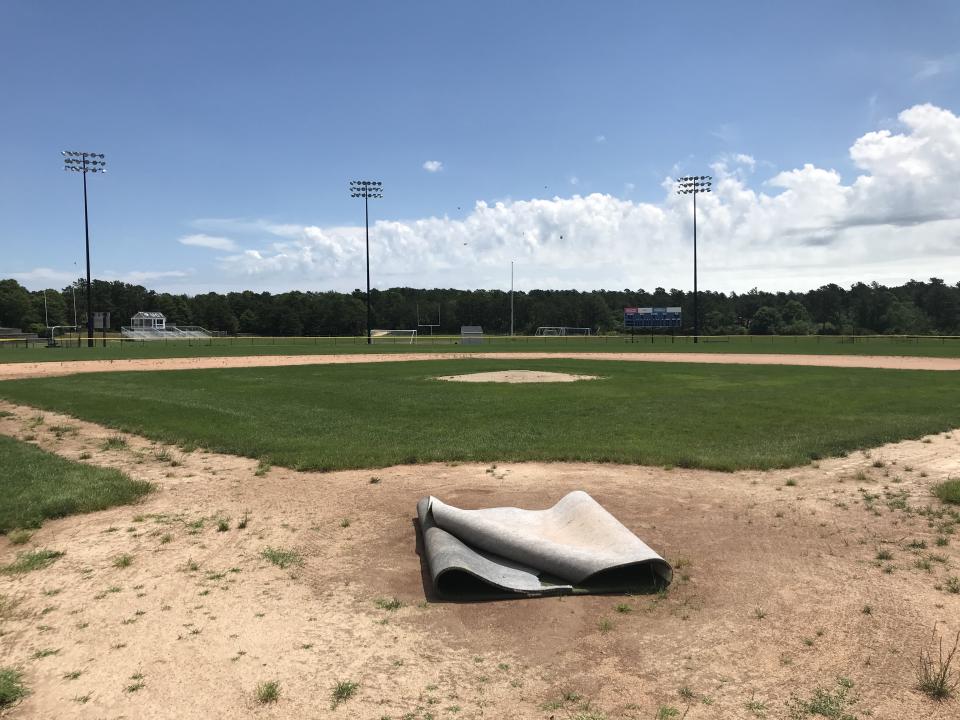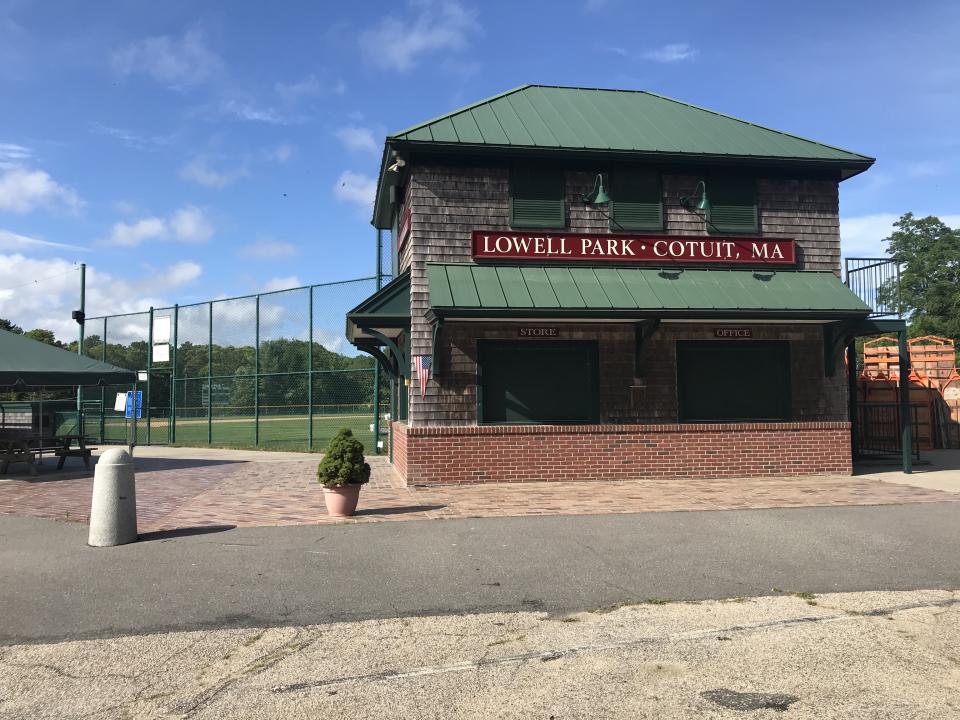Loss of Cape Cod Baseball League leaves incalculable void

CAPE COD, Mass. — A summer breeze cuts through the overgrown patches of crabgrass around Doran Park’s otherwise empty home plate, where Pete Alonso once dug in for Bourne.
Falmouth’s desolate Guv Fuller Field, once home to A.J. Pollock and Jacoby Ellsbury, is overrun with birds flying in aimless circles.
The most action Lowell Park has gotten all summer comes when a local family brings their two dogs to play fetch. The Cotuit Kettleers won the 2019 Cape Cod Baseball League championship there last year, a title they don’t know when they’ll be able to defend. For now, Lowell Park’s “no dogs on field” sign is meaningless.
Those ballparks, as well as the other seven diamonds scattered across Cape Cod, are devoid of baseball this season.
For over a century, hundreds of the best college baseball players have flocked to the Cape for summer ball. Highly touted college stars can cement themselves against elite competition, and lower-division ballplayers can emerge as MLB prospects. The nonprofit wooden bat league, a staple of beach communities usually filled with retirees and vacationers, is mostly run by volunteers and tickets to games are free.
One in every six MLB players spent time in the CCBL, per its website. Sixty-five percent of players drafted in the abbreviated 2020 MLB draft, including No. 1 overall pick Spencer Torkelson, played in the 10-team league. Other Cape League alumni include Aaron Judge, Kris Bryant, Charlie Blackmon, and Marcus Stroman.
“For all the players to miss the experience of playing in the Cape is just so heart-wrenching, because it's something you can't duplicate anywhere,” Cotuit manager Mike Roberts told Yahoo Sports.
The same qualities that make the league unique also make it impossible in a global pandemic. Even as MLB plans to play a season, Cape League president Chuck Sturtevant said he has no regrets from the executive board’s unanimous decision to cancel the season on April 24.
But it doesn’t change the drastic impact a summer without baseball has on Massachusetts’ hooked peninsula. Players, managers, league executives, host families and fans are missing something that makes The Cape The Cape just as much as beach traffic, lobster rolls and potato chips.
Tales of the summer
This is the first summer without Cape League baseball since World War II interrupted the 1945 season, but the CCBL officially began in 1885. The history of the league has been passed down through the years in the form of urban legends.
The folklore paints a Norman Rockwell-ish picture of the league. Stories permeate through the region and range from myth-making rumors to the undeniably biographical.
In Falmouth, future two-time MLB All-Star Darin Erstad would work his day job at the local laundromat in the morning, then practice kicking field goals on the Commodores’ field before games in preparation for Nebraska’s 1995 national championship season.
Matt Wieters learned how to frame pitches on the Cape. Albert Belle pumped gas in Harwich. Mitch Moreland still goes fishing with his host father every summer.
Aaron Boone, who made up a vaunted left side of the Orleans infield with Nomar Garciaparra, still knows his host mom’s phone number by heart. Jason Varitek paid off his host family’s mortgage. Chris Sale buys his host family opening day tickets every year.
"I tell players, this is going to be a very special summer,” said Bourne Braves manager Harvey Shapiro, who’s coached in the CCBL for more than 22 years.
“As you get older, you'll appreciate it more and more,” Shapiro continued. “What makes me feel good is when I hear from a former player, and some of these guys have played in the major leagues, and they say, 'That was the greatest summer of my life.’”
Peter Gammons, who’s covered baseball for more than 50 years, has gone to Cape League games since 1988 when he watched Frank Thomas, Jeff Bagwell and Mo Vaughn compete in the home run derby at the CCBL’s All-Star Game. The J.G. Taylor Spink Award Winner believes the Cape is a better place for players to develop than in college because they have more freedom and get micromanaged less frequently by managers.
“It's their first taste of what professional baseball's like,” Gammons said. “You play every day, you grind it out, you're going to learn.”
That’s an experience many amateur players won’t get this year. Only a handful of summer leagues continued this summer, leaving players committed to the CCBL scrambling to find competition.

Aaron Palensky, an All-Big Ten outfielder at Nebraska, had his junior season cut short by the COVID-19 pandemic. Shortly after, his plans to play for Chatham fell through. Had the New York Yankees not signed him after the shortened 2020 MLB draft, he’d be left without options.
“I got really bummed (when the CCBL was canceled),” Palensky said. “The Cape League is the premier league of collegiate summer ball. I was really looking forward to competing at a high level and working on my game, developing my game."
What the Cape’s really missing
If the Cape League is as magical as everyone believes, its allure doesn’t just originate from the field.
Though players used to work day jobs, most of them now get paid to lead youth camps. They teach boys and girls between 5 and 14 years old the fundamentals of baseball.
Cotuit alone had 500 kids participate last year, slip-n-sliding down the basepaths every Friday. Each CCBL franchise runs clinics, and often invites campers to stand on the field with the teams for the national anthem or sing “Take Me Out to the Ballgame.”
“That's a missed opportunity for the kids of each town to go and see the stars of the future,” league commissioner Eric Zmuda said. “The stars of tomorrow play today. The personal connection they have, because these kids get to see them in a very small grouping and have some 1-on-1 time with them.”
The personal connections Cape teams make extend beyond the clinics. Players and managers have gone to local malls and libraries to read to children. Some have visited local senior centers or played with kids for a field day before school lets out for summer.
Lowell Park is also where Roberts, the Cotuit manager, normally caps every Fourth of July parade by sitting in the dunk tank, then throwing batting practice to anyone who wants to feel like a Cape Leaguer.
“The players become part of the community,” Gammons said.
Still, there’s also a more tangible aspect to the loss of the season.
The CCBL generates roughly $3 million in annual revenue for the community, according to Wendy Northcross, CEO of the Cape Cod Chamber of Commerce. Although the games are free, tourists come to see baseball comparable to Double-A talent and spend money at local hotels, shops and restaurants. That’s cash that won’t flow through the 10 beach towns this summer.
In Chatham, Anglers players would normally take their daily lunch breaks at Red Nun Bar & Grille, which shares a parking lot with Veterans Field. Game days turn the local watering hole into a “madhouse” and overwhelm the kitchen, Red Nun manager Luke Lowans said.
There’s also some concern the league might not be able to return in 2021, which would further affect local economies. If the virus causes college baseball to delay its season, it could interfere with the Cape League. CCBL executives are hopeful and working on contingency plans, but “we’ll wait and see,” Sturtevant said.
"Everything's up in the air,” the league president added.
Home sweet home
Just about anyone who lives on the Cape at least knows someone who’s housed a Cape League player. For student-athletes use to dorm life, it’s a “marvelous atmosphere” and a nice change of pace, Roberts said.
Colin and Danielle Walsh have housed seven Cotuit players in the past four years in their nearby Sandwich house. Their son learned baseball at the Ketteleers summer camp when he was five years old, and grew up going to the games with his parents. Sometimes, his CCBL brothers would drive him home from games. The Walshes were supposed to host again this summer.
“It's such a big part of what the Cape Cod summer is all about,” Colin said. "To not have it, it's a big hole."
Zmuda, the commissioner, has hosted players since 2010. His home, quiet for the first summer in a decade, is a metaphor for a baseball-less Cape. “It’s just not the same,” he said.

“They become part of your family really for not just your summer, but in most cases forever,” Zmuda said. “We have a lot of guys we've stayed in touch with. We've been to a few different weddings. Our wife says we have a couple of host grandbabies now."
Last year, Luke Bartnicki pitched for the Anglers and had two roommates who were position players on the team. Their host family treated them to the “whole nine yards,” he said — kayaks, paddle boards, a makeshift movie theater in the garage.
Bartnicki, a sophomore reliever at Georgia Tech, felt how special the Cape League is to the region the second night he moved there from Georgia, when his host family took him out for dinner.
“The waitress was there and I was wearing some of my Chatham gear from practice, and she started absolutely freaking out over it,” Bartnicki said. “She goes, 'Oh my God, you're a Chatham baseball player? You're a celebrity.'”
With no baseball, there are no “celebrities.” No new tales to pass down. Just empty fields, picturesque signs of the time.
More from Yahoo Sports:

 Yahoo Sports
Yahoo Sports 